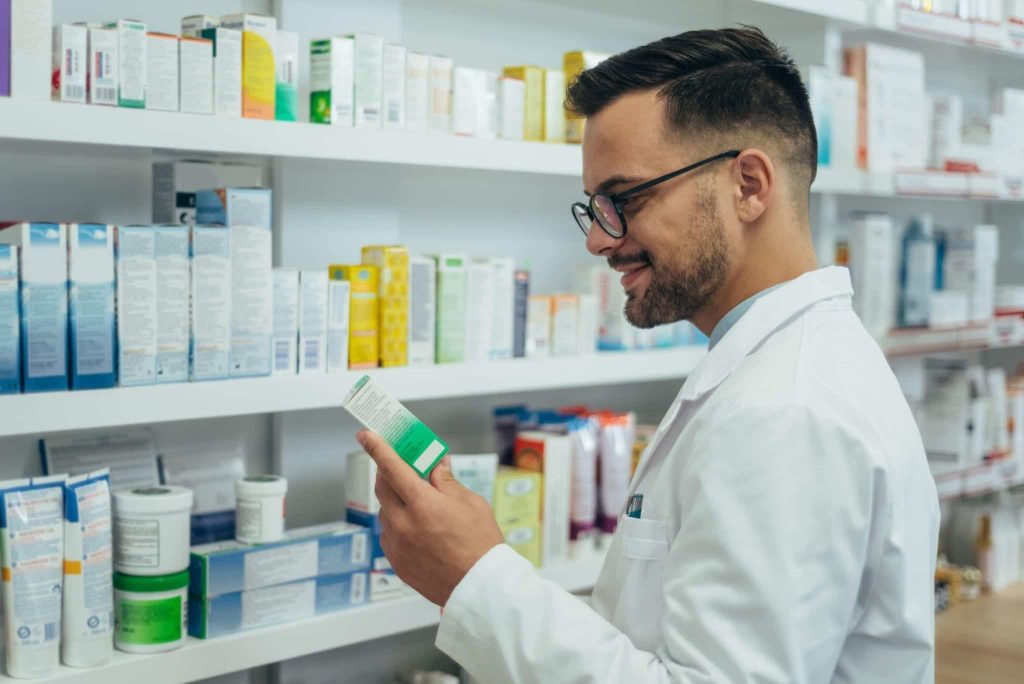What Is A Pharmacist & What Do They Do?
Pharmacists are healthcare professionals who work with medication in all shapes and forms. This includes taking care of the production, preparation, distribution, and usage of all types of medicine. Pharmacists serve a crucial healthcare role, providing communities with the necessary advice on medication use and ensuring citizens’ public health and well-being.
A tremendous amount of effort and responsibility goes into a pharmacist’s job. Are you interested to learn more about this noble profession? In this article, we’ll give you an in-depth overview of the skills, education, and duties in the line of work of a pharmacist.
Let’s dive in!
Contents
What Is A Pharmacist, And What Does Their Job Include?
You can think of pharmacists as intermediaries between patients and doctors who prescribe medication. Pharmacists interpret prescriptions that doctors give patients, dispense and manage medication, and provide necessary information on all essential details, including:
- Dosage,
- How long should the patient use the prescribed medication,
- How to renew the prescription,
- Possible side effects, etc.
In addition, pharmacists have the task of accurately recording dispensed medication, monitoring peoples’ therapies, and working with other healthcare professionals to provide the best care for patients. They can work in different settings, commonly retail pharmacies, and hospital/clinic pharmacies.
Pharmacists often interact with customers and must be able to communicate effectively and empathically. Additionally, they need to be able to explain medication instructions and potential side effects clearly and in simple terms. Good people skills are crucial for building trust and maintaining positive relationships with patients and healthcare providers.
If you need advice from qualified pharmacists highly skilled in personalized customer service, you can check out Everest Whole Health Pharmacy.
Daily Duties Of A Pharmacist

Some of the duties pharmacists perform on a daily basis include:
- Dispensing medication to patients as prescribed by a doctor or other healthcare professional.
- Ensuring the accuracy and safety of prescriptions.
- Advising and informing patients and other healthcare professionals about medication, accurate usage, dosage, side effects, interactions with other drugs, etc.
- Monitoring patients’ medication therapies for safety.
- Collaborating with other healthcare workers, such as physicians and nurses, to provide excellent patient care.
- Keeping accurate documentation of dispensed medication, as well as patient information.
- Staying current with new developments in healthcare and pharmacy through continuing professional development.
- Maintaining the security of controlled substances and other drugs in the pharmacy.
- Pharmacists can also handle the day-to-day operations of a pharmacy, such as ordering and stocking medication, hiring and supervising staff, and managing inventory and finances.
The Journey To Becoming A Pharmacist
To obtain the calling of a pharmacist, people need to go on quite a long academic journey. First, they must get an undergraduate degree. Common undergraduate degrees for pharmacists include biology, chemistry, or medicine majors, along with necessary pre-pharmacy programs.
After completing the undergraduate program, students must complete a Doctor of Pharmacy (Pharm.D.) degree program, which typically takes four years. The curriculum for these programs includes coursework in pharmacology, medicinal chemistry, pharmacy practice, pharmacotherapy, pharmacokinetics, drug interactions, etc.
After completing a Pharm.D. program, graduates must pass a licensure examination to practice their profession. Some countries require practical experience before granting a license, such as internships, externships, or residencies.
How Do Pharmacists Help People?

Here are some practical ways pharmacy professionals help people around the world:
- Medication Therapy Management (MTM): Pharmacists provide MTM services to patients with multiple chronic conditions who use various medications. They review patients’ medication regimens, identify potential drug-related problems, and recommend that physicians and other healthcare providers optimize therapy and prevent negative reactions.
- Medication Adherence: Pharmacists work with patients to ensure they understand how to take their medications properly and provide education and resources to help patients stick to their treatment plan.
- Immunization: Most pharmacists possess training and authorization to administer vaccines, which can help protect people from severe and even deadly diseases.
- Health screenings and assessments: Some pharmacists provide health screenings and assessments, such as blood pressure or cholesterol checks, and offer recommendations for lifestyle changes to improve overall health.
- Counseling: Pharmacists give patients and caregivers all the necessary advice about medicine usage.
- Drug Interactions: Pharmacists are experts in identifying potential drug interactions and can advise patients and healthcare providers on how to avoid or manage these interactions to minimize the risk of harm.
Pharmacist’s Skills

Pharmacy is a highly responsible and stressful line of work that can directly impact people’s well-being. That’s why pharmacy professionals need a well-developed set of competencies, including:
- Strong attention to detail,
- Critical thinking,
- Verbal and written communication skills,
- Compassion,
- Integrity,
- Math and counting skills,
- Multitasking abilities,
- Willingness to advocate for patients,
- Time management skills.
What Are The Different Types Of Pharmacists?

Pharmacists can work in various fields and healthcare settings, depending on their preferences and skills. Each of these fields of pharmacy comes with unique responsibilities and areas of expertise. Here are a few examples:
- Retail: Most typical pharmacy work is in drugstores, supermarkets, and big-box stores. Retail pharmacists are responsible for dispensing medications, providing patients with information and advice, and managing the pharmacy’s daily operations.
- Compounding: This pharmacy field includes preparing specialized solutions for unique cases that commercially available medicine can’t solve. Specialty medicine is very costly, requires special storage, administration, and monitoring, and has high risks of dangerous side effects.
These medications treat complex illnesses, and typical retail pharmacies don’t keep them in stock. Compounding pharmacists are experts in measuring and administering this type of medicine to treat severe medical cases.
- Hospitals: Pharmacists who work in hospital-adjacent pharmacies and other healthcare facilities are responsible for giving medications to patients, reviewing and interpreting prescription orders, and working with other healthcare providers to ensure the best interest of patients. They are also responsible for handling the medication inventory and participating in drug formulary management.
- Clinics: Pharmacists that work in clinics, long-term care facilities, and ambulatory care centers focus on providing patient care by optimizing medication therapy, preventing drug-related problems, and providing MTM services.
- Home Care: Pharmacists specializing in home care provide services and treatments to patients in their houses, residential care facilities, and specialty infusion centers.
- Industrial Pharmacy: Professionals in the pharmaceutical industry are involved in the research and development, manufacturing, and marketing of medications. They also work in regulatory affairs, quality control, assurance, or similar areas.
- Academia: Teaching and researching are a route some pharmacists also choose to take. Academic pharmacists can become professors in pharmacy schools or researchers in universities or research institutes. They can also serve as preceptors for pharmacy students and residents.
Difference Between Pharmacists And Pharmacy Technicians
Have you ever been confused by the difference between pharmacy employees? Pharmacy technicians typically do not have a healthcare license and work under a licensed pharmacist’s direct supervision. They must complete a pharmacy technician training program and pass a certification examination to be eligible to work in a pharmacy.
Pharmacists are responsible for overall pharmacy management, ensuring medication safety and effective use. Pharmacy technicians assist pharmacists in dispensing medication and performing other technical and administrative tasks.
Find A Knowledgeable Pharmacist With Great People-Skills
Pharmacists are a crucial part of the medical industry, ensuring the safety of medication distribution and usage. They undergo years of education and training to provide the best healthcare services.
So, if you need over-the-counter medication, help deciphering your doctor’s prescriptions, or general medical advice, find a great local pharmacy and consult the personnel working there.
Feel free to ask them anything that interests you and inform yourself properly about the best medicine for your specific situation.
These qualified professionals are happy to give you advice, provide excellent customer service and ensure the overall well-being of their pharmacy’s visitors.
Good luck!
Read Also:
- 3 Pioneering Surgical Technologies in 2021
- Top Nursing Specialties Growing Rapidly
- How To Pursue A Career In Medical Sales



